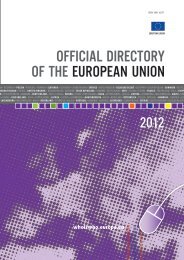Life Events - EU Bookshop - Europa
Life Events - EU Bookshop - Europa
Life Events - EU Bookshop - Europa
Create successful ePaper yourself
Turn your PDF publications into a flip-book with our unique Google optimized e-Paper software.
Costs and gains: Gov 2.0 is conceived as a means of making government services<br />
more responsive and eff ective and, in parallel, enabling them to ‘slim down’; this<br />
trend complements the directions taken by other organisations and their use of<br />
Web 2.0 technologies, a shift which is transforming both the economy and people’s<br />
lives. In addition, Gov 2.0 off ers the possibility to “unlock the immense economic<br />
and social value of information and other content held by governments to serve<br />
as a precompetitive platform for innovation” 10 .<br />
Th e study had the opportunity to examine provisionally what a shift towards<br />
a more modular approach to life events in a Web 2.0 context might mean. It<br />
identifi ed clear gains, such as: higher responsiveness to the expectations and<br />
needs of citizens as and when they require certain services; fulfi lment of policy<br />
mandates and coordination on their accomplishment; greater transparency;<br />
greater collaboration and cooperation across services, between government and<br />
third parties, and between citizens and their government.<br />
Th e study explored in some detail the potential costings with regard to life events,<br />
platforms, and dynamic public services mediation. A rigorous and in-depth costbenefi<br />
t analysis was not undertaken, but should certainly be considered for future<br />
possible application.<br />
Th ree broad possibilities with regard to costings were identifi ed that would be<br />
needed to facilitate the future vision of service provision: First, when implementing<br />
a fi nite set of life events, development costs are stable over time. Investment costs<br />
are assumed to be reduced over time. Second, the implementation of government<br />
as a platform, requires higher investment upfront due to the installation of the<br />
platform. Th e development costs are reduced over time as private initiatives will<br />
gradually take over the development. Th ird, dynamic public services mediation<br />
requires a very high investment budget upfront (since all Member States would<br />
need to agree on a semantic model). Over time, however, the development cost<br />
would be lower due to the re-usability of the semantic services.<br />
10 Engage, Getting on with Government 2.0, Report of the Government 2.0 Taskforce. (2009),<br />
http://www.fi nance.gov.au/publications/gov20taskforcereport/doc/Government20TaskforceReport.pdf<br />
19 •••
















